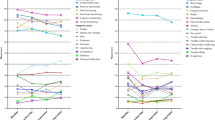Abstract
Reflecting a limited understanding of the definition and determinants of health-related quality of life (HRQoL), the majority of research in this field has concentrated upon the effect of disease- and treatment-related variables. That work specifically investigating HRQoL among upper aerodigestive tract (UADT) cancer patients is no exception to this observation. Treating subject-related and non-subject-related variables separately, the aim of this study was to investigate predictors of global HRQoL rating in a sample of UADT cancer patients, concentrating upon the relative importance of sociodemographic and clinical variables. A cross-sectional study design was used with a sample of 188 UADT cancer patients. Global HRQoL was assessed using the EORTC QLQ-C30 instrument, global domain (global QoL). Other study variables were collected by subject interview and chart review. Two multivariate regression models were independently developed, containing, respectively, subject-rated and non-sunbject-rated variables. In the model containing subject-rated predictors of global QoL, emotional, breathing, physical, financial, pain and appetite problems were significant predictors (F = 14.6, p < 0.0001 and r2 = 0.54). Among non-subject-rated sociodemographic and clinical variables tested, unemployment, older age, female gender, being dentate and a more advanced disease stage predicted worse global QoL rating, while oral as opposed to pharyngeal or laryngeal cancer predicted a better global QoL rating (F = 5.1, p < 0.0001 and r2 = 0.21). In the latter model, a greater proportion of the variance was explained by sociodemographic variables than by clinical variables.
Similar content being viewed by others
References
Hunt SM. The problem of quality of life. Qual Life Res 1997; 6: 205-212.
Wilson IB, Kaplan S. Clinical practice and patients' health status: how are the two related? Med Care 1995; 33(1): AS209-214.
Aaronson NK, Ahmedzai S, Bergman B. The European Organization for Research and Treatment of Cancer QLQ-C30: a quality of life instrument for use in international clinical trials in oncology. J Natl Cancer Inst 1993; 85: 365-376.
Wilson IB, Cleary PD. Linking clinical variables with health-related quality of life. A conceptual model of patient outcomes. J Am Med Assoc 1995; 273(1): 59-65.
Guttman L, Levy S. On the definition and varieties of attitude and well-being. Soc Ind Res 1982; 10: 159-174.
Ormel J. Neurotism and well-being inventories: measuring traits or states? Psychol Med 1983; 13: 165-176.
Deiner E. Subjective well-being. Psychol Bull 1984; 95: 542-575.
Gotay CC, Moore TD. Assessing quality of life in head and neck cancer. Qual Life Res 1992; 1: 5-17.
Jones E, Lund VJ, Howard DJ, Greenberg MP, McCarthy M. Quality of life of patients treated surgically for head and neck cancer. J Laryngol Otol 1992; 106: 238-242.
Bjordal K, Kaasa S, Mastekaasa A. Quality of life in patients treated for head and neck cancer: a follow-up study 7–11 years after radiotherapy. Int J Radiat Oncol Biol Phys 1994; 28(4): 847-856.
Bjordal K, Freng A, Thorvik J, Kaasa S. Patient of self-reported and clinician-rated quality of life in head and neck cancer patients: a cross-sectional study. Oral Oncol Eur J Cancer 1995; 31B(4): 235-241.
Schliephake H, Neukam FW, Schmelzeisen R, Varoga B, Schneller H. Long-term quality of life after ablative intraoral tumour surgery. Cranio Maxillo-facial Surg 1995; 23: 243-249.
Schliephake H, Ruffert K, Schneller H. Prospective study of the quality of quality of life of cancer patients after intraoral tumour surgery. J Oral Maxillofacial Surg 1996; 54: 664-669.
List MA, Ritter-Sterr CA, Baker TM et al. Longitudinal assessment of quality of life in laryngeal cancer patients. Head/Neck 1996; 18: 1-10.
Hammerlid E, Mercke C, Sullivan M, Westin T. A prospective quality of life study of patients with oral or pharyngeal carcinoma treated with external beam irradiation with or without brachytherapy. Oral Oncol 1997; 33(3): 189-196.
Bjordal K. Mastekaasa A, Kaasa S. Self-reported satisfaction with life and physical health in long-term cancer survivors and a matched control group. Oral Oncol Eur J Cancer 1995; 31B(5): 340-345.
Long SA, D'Antonio LL, Robinson EB, Zimmerman G, Petti G, Chonkich G. Factors related to quality of life and functional status in 50 patients with head and neck cancer. Laryngoscope 1996; 106: 1084-1088.
Matheison CM, Logan-Smith LL, Phillips J. Macphee M, Attia EL. Caring for head and neck oncology patients. Does social support lead to better quality of life? Can Family Physician 1996; 42: 1712-1720.
Bjordal K, Kaasa S. Psychometric validation of the EROTC core quality of life questionnaire, 30-item version and a diagnosis-specific module for head and neck cancer patients. Acta Oncol 1992: 31(3): 311-321.
Aaronson NK, Acquardro C, Alonso J, et al. International quality of life assessment (IQOLA) project. Qual Life Res 1992; 1: 349-351.
American Joint Committee on Cancer. Manual for Staging of Cancer, 4th edn. Philadelphia: J.B. Lippincott, 1992.
Allison PJ, Locker D, Feine JS. Quality of life: a dynamic construct. Soc Sci Med 1997; 45(2): 221-230.
Schipper H, Clinch J, McMurray A, Levitt M. Measuring the quality of life of cancer patients: the Functional Living Index-Cancer: development and validation. J Clin Oncol 1984; 2: 472-483.
Allison PJ, Franco EL, Black M, Feine JS. The role of professional diagnostic delays in the prognosis of upper aerodigestive tract cancer. Oral Oncol 1998; 34(2):147-153.
Author information
Authors and Affiliations
Rights and permissions
About this article
Cite this article
Allison, P., Locker, D., Wood-Dauphinee, S. et al. Correlates of health-related quality of life in upper aerodigestive tract cancer patients. Qual Life Res 7, 713–722 (1998). https://doi.org/10.1023/A:1008880816543
Issue Date:
DOI: https://doi.org/10.1023/A:1008880816543



